Awake at night: Giving Voice to Victims in Ukraine
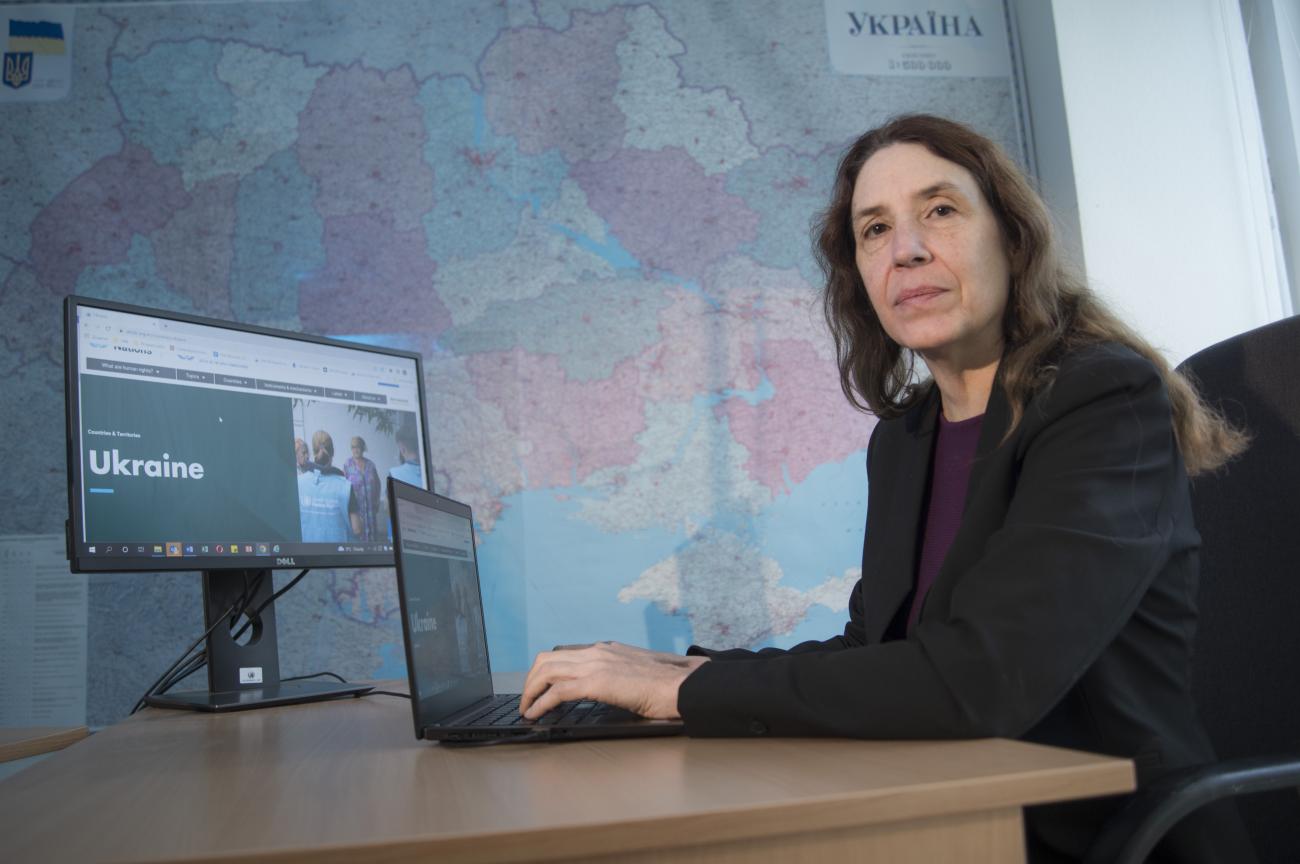
[Podcast transcript] S6-Episode 5 with Matilda Bogner, Head of the United Nations Human Rights Monitoring Mission in Ukraine
Interviewed by Melissa Fleming, the United Nations' Under-Secretary-General for Global Communications
Matilda Bogner’s job is to bear witness to unspeakable crimes. As head of the United Nations Human Rights mission in Ukraine, she and her team record accounts of horrific abuses and rights violations in a bid to bring the perpetrators to justice and ease the victims’ suffering.
“It's a very complicated job, but it is meeting people and finding out their stories. It's giving voices to victims. That's what motivates me.”
Russia’s invasion of Ukraine has devastated millions of lives. Civilians have been subjected to summary executions, disappearances, arbitrary arrests, and rape. In this episode, Matilda Bogner reflects on the scale of these horrors, the mental health impact of documenting them, and on her urgent quest to raise the alarm with the rest of the world.
TRANSCRIPT OF THE INTERVIEW IS BELOW. LISTEN TO THE AUDIO VERSION HERE.
Matilda Bogner
It's a very complicated job. It is meeting people and finding out their stories. It's giving voices to victims. That's what motivates me.
Melissa Fleming
From the United Nations, I'm Melissa Fleming. I was really struck by the huge challenges my colleague Matilda Bogner takes on as head of the United Nations Human Rights Mission in Ukraine. She spends her days gathering accounts of abuse and violence. It's all about bearing witness as she told me in this edition of Awake at Night. So, Matilda, you've worked in Ukraine since 2019. Where were you when the war broke out in February of this year? And how did you feel when you heard the news?
Matilda Bogner
Actually, I woke up very early in the morning in the apartment where I was living with my family. I actually woke up at like about 4 am thinking, ‘Oh no! It's all started.’ And I rushed to the window, and I saw that they were taking out the rubbish and it was just the rubbish trucks. And I got back in bed feeling quite relieved only to be woken one hour later. And find my husband already sitting in the sitting room, seeing flashes in the distance, and hearing actual strikes happening. It felt very surreal, actually, at that time. But we had immediately to start thinking about staff safety. So, we were straightaway doing the security calls to all the staff and worrying about who was answering and who was not. But it was fine. Everybody answered in the end, so.
Melissa Fleming
So, you're really living in Kyiv with your husband and family. Did you say children?
Matilda Bogner
Yes, three children were here. I have four children. No, actually, sorry. At that time, two were with us. We were enjoying living in Kyiv. And I had worked in this region some years before. And my husband speaks Russian. And so, it was a place that we'd been looking forward to coming to and to staying together in for a while.
Melissa Fleming
I understand you also speak Russian. How did you come to learn Russian because you're from Australia?
Matilda Bogner
Yes. I did a law degree at university. And as a side subject. Well, I saw they were offering Arabic and Russian. And that was quite unusual. So as a side subject, I studied Russian. And actually, in the third year, and final year, of the Russian classes, there were only two of us. So certainly not a popular language to learn.
Melissa Fleming
Only two who made it through. So, it makes it easy for you to also understand Ukrainian.
Matilda Bogner
Yes. I mean, often I speak to people in Russian and I mean, most Ukrainians speak Russian. But if they don't, or if they don't want to, they often answer me in Ukrainian. So, we have a sort of double language conversation where we understand each other well enough to communicate.
Melissa Fleming
Must be so much more conducive to your work than for a lot of internationals who serve in Ukraine but can't speak the language and have to rely on interpreters.
Matilda Bogner
Yes, that was in large part one of the reasons why I wanted to come to Ukraine. I thought… Both I understand the context from having worked in this part of the world in the broader region, but also because I could use my language skills. And I mean, many people in Ukraine, Russian is their first language. So, I do interviews in Russian. I have meetings in Russian. Or sometimes as I said, sort of with dual languages. But it makes it a lot easier. I really prefer working in countries where I can speak the language.
Melissa Fleming
Well, at the UN mission that you work for, which is the Human Rights Mission in Ukraine, it was actually set up following the conflict in 2014 in the east of the country, and by Russia's annexation of Crimea. Did that prepare you in any way for Russia's invasion of Ukraine or were you really surprised when the hostilities actually broke out?
Matilda Bogner
I have to say I was surprised. I didn't really believe it would come to this. I mean, in just the last weeks been before it happened, I started to believe that something would happen. There were too many signs. And I believed something would happen. But I still didn't believe that it would get to this point. And I must say, even on the morning of the 24th, I even thought, then, ‘Maybe they're just doing a few strikes to show that they can, and maybe they will stop. At least for the rest of the country. Maybe things will escalate in the east or in the south. Maybe they would try to take Kherson and some of these areas to give them a buffer zone for entering to Crimea.’ But I still didn't fully believe even then that would quite turn out like it has.
Melissa Fleming
Certainly, very few could have imagined how horrific it would become. So, it must be really distressing for you to hear the stories of abuse and violence, which is actually your job, right? What is your job? What do you do as Head of the UN Human Rights Mission?
Matilda Bogner
I mean, it's a very complicated job. It is meeting people and finding out their stories. It's giving voices to victims. And that is a very hard part of the job. It can be very satisfying too when people thank you for having listened to them. When you can get others to be responsive to those voices. But it can be very difficult. But it is also a lot of other things. I mean, there's a lot of management. There's a lot of just trying to keep a big office together. And particularly when it's going through such enormous changes as happened after the 24th of February. There's a lot of logistics. There’s ensuring the security of your staff. I have to say the part that really does keep me going is going to the field and talking to the people. And then being able to come back and relate that to other people who have the power to make decisions. That's what motivates me.
Melissa Fleming
Right. And you are bearing witness. Is there a particular story that is really affecting you or that you can't let go of?
Matilda Bogner
There are many, many stories. I mean, one that springs to mind when you ask is when we went to Bucha and Irpin and these areas just north of Kyiv after the Russian forces had withdrawn. And we went to this street that is very well-known in Bucha that translates as “Apple Street”. And it was where some of the worst abuses happened with just summary executions of civilians. Anyway, we went to one of the side streets off of that. Just randomly. We didn't have a specific plan. Except we knew this was the area where a lot had happened. And we were just knocking on the gates to see if people in their houses would talk to us. And we knocked on the gate of one place and a man came out, and then his neighbour came out. And the man who came out initially had some sort of psychosocial disability, some difficulties with communication. And his neighbour was clearly looking out for him and said, ‘You go home. You know, I'll talk to these people.’ So, he went home, and this other man stayed. And we just said, ‘You know, what happened to you during the time of the occupation?’
And he started to tell his story and how, basically, after some time, when they started to feel that it wasn't safe to stay, the women and children came together from the neighbourhood and they got in a convoy and they left. And the men stayed in order to look after the houses and the property and so on. So, he was one of them. And he explained how he started to cook. Electricity had gone off. So, they were cooking outside. It was still quite cold. So, they were cooking on a fire with their saucepans. And one day, Russian troops came, and they called them all to come onto the street. So, this group of neighbours who had been cooking together, they came onto the street. And one of them was a person they didn't know so well from the neighbourhood, who had joined them. And the Russians started to ask them to look at their telephones and so on, to look at the content. And they took them, and they looked at the content of the phone of this man that they didn't know quite so well. And they saw something on there. They don't know what. And they just said, ‘Come with us.’ And they took this man around the corner and then the group heard these shots fired. And they understood he had just been killed. And then the Russians came back, and the man wasn't there. And the man we were talking to said, ‘Can we bury him?’ He was thinking about respect. And the Russians said, ‘Not now. You can do it in the evening.’ And so, they went back into their houses. And he waited until evening. And then he went, and he buried the body of this man who he had just been cooking with. That was a story that really, yeah, it was shocking to hear.
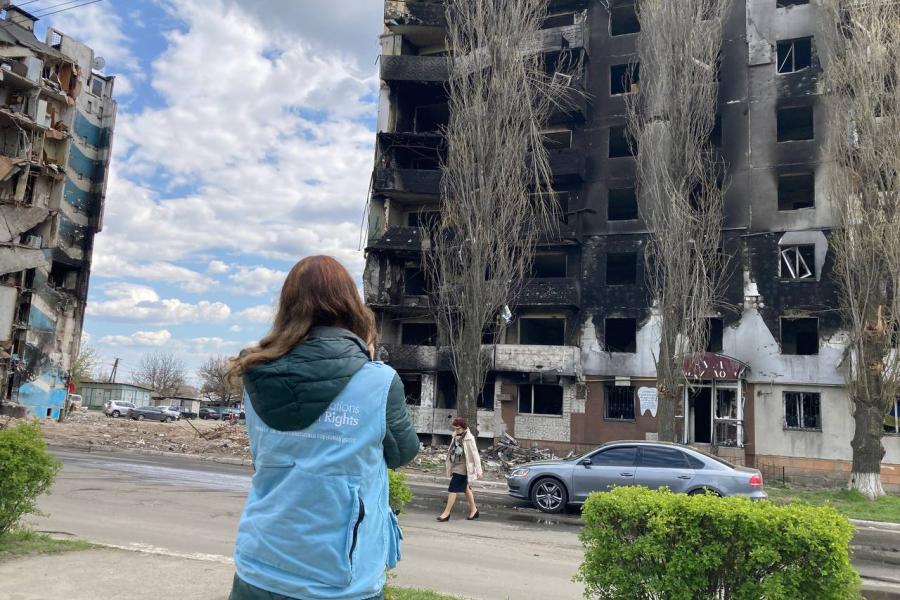
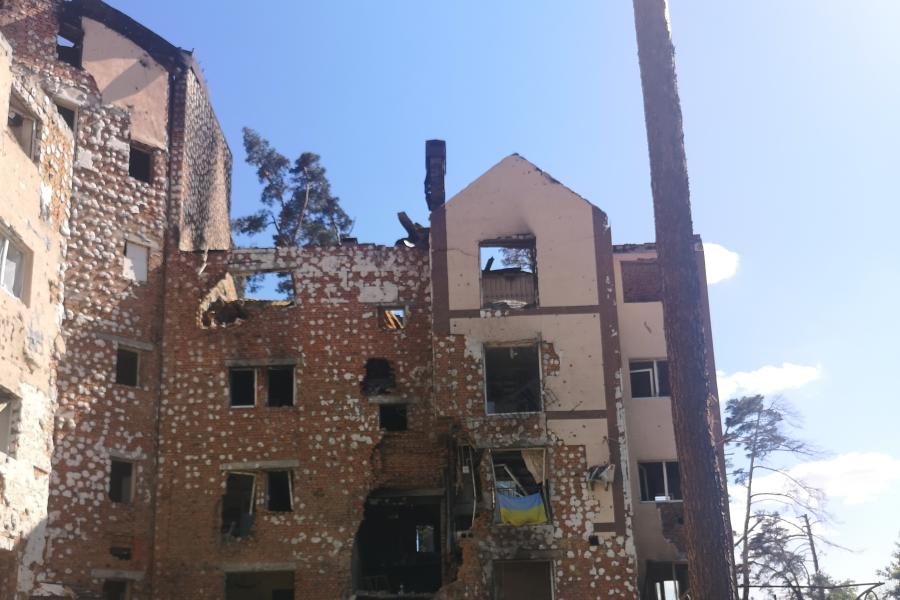
Melissa Fleming
It must really affect you when you go home at night. And how do you kind of deal with it personally, these trauma stories that you have taken in yourself?
Matilda Bogner
I mean, I don't know if I do deal with it enough. I mean, I have been doing this for many years. And sometimes the stories do sort of build up, and it sometimes feels too much. But then… I mean, then I see the value of the work that we're doing. I see that we can share these stories. We can make a difference somehow. I don't know. Just keep going. Yes.
Melissa Fleming
I remember reading an account of your visit to Chernihiv, the Chernihiv region. And your encounter with a 70-year-old man there who spent a lot of time in a basement. Can you describe what he told you?
Matilda Bogner
So, we went to Chernihiv. And we went to this specific, very small, it's like a village, very small-town village, where the Russians forced a group of civilians to go into this basement. On the one hand, it was for their security. But on the other hand, they were forcing them to be there. What appeared to be to provide them a certain level of protection from the incoming shooting from the Ukrainian side. And they spent weeks in that basement. And when we went there, we just went to this school area, and no one was there. So, we just walked around the streets there. And he started to approach, and we said, ‘Were you here during the time of the occupation? Do you know about the people who were underground here?’ And he said, ‘Yes, yes, I was one of them.’ And he said, ‘I can show you around.’ And he took us down. And he showed us exactly where he had spent his time. And he said, ‘There were so many people in here. I couldn't lie down. I would tie myself to this wooden structure so that I wouldn't fall over when I would go to sleep.’ And then he took us into this smaller sort of side room, all in this basement. And it was damp, and it was dark. And there was no light and no toilets. Nothing. And in this smaller room, there were these two lists. One on either side of the door, which had names. And we said, ‘What's that?’ And he said, ‘They are the names of the people who died while we were down here.’ And they had the names and the dates. And he told us about each of them who had died. Mostly they were elderly people who whose health just didn't hold out.
Melissa Fleming
So, how long was he in that basement?
Matilda Bogner
I've forgotten the exact number of days, but it was about three weeks.
Melissa Fleming
Three weeks and they must have not had any means to bury them properly. And no sanitary facilities. I wonder how they ate. And did they have supplies?
Matilda Bogner
They did let them to go out certain periods of time. Particularly in the early morning they would let them go out for about half an hour. They would have to go out quickly, run to your home or wherever and get a few supplies and come back. Sometimes people were able to go out if they insisted to go to a toilet, which was sort of in this yard. Other times they would have to… They just used the corner of one of the small rooms. And with the dead bodies, they would take them out and they just stacked them next to this small outhouse that was in the yard.
Melissa Fleming
It must be absolutely… Even though you have worked in very difficult places before, it must be incredibly shocking for you to see this level of inhumanity.
Matilda Bogner
Yes. I mean, it's very hard to understand. I still find it difficult to understand that people can treat each other in these ways. It never makes sense to me. And just seeing the suffering of the people. It's awful. And it will last for years and years. Even if the hostilities were to stop tomorrow, their memories will be there. And this will be a part of their lives forever.
Melissa Fleming
The losses of family members and friends. And the atrocities that they've witnessed are not to be forgotten.
Matilda Bogner
No, no, no, no, they mustn't be. And they won't be. I mean, maybe by the rest of the world, but they certainly won't be by their own communities.
Melissa Fleming
And that is part of your job, also. To hear these accounts, to write them down, to report them. How does that work? I mean, you have a team of how many? And how do you travel? And how do you gather? And then, what is the process of getting your reports out? Where do they go?
Matilda Bogner
So, we have a bigger team now than we had before February. Before February, we were about 55. Now we're up to about 85 people. We have field offices. They have had to move locations. One of our field offices before February was in Mariupol. But we've insisted that they evacuate on the 24th of February because we understood that was a very precarious place to be. So now we have field offices still in the east of the country in places where they can reach out to places where there are hostilities we have in the south, and so on. The core of the work is really going on missions from our field offices. It's going out to meet people in communities. In some places that, you know, that I just described, you just can walk along the street, and you will meet people. But in other places you need to identify. You know, you can't just arrive. You need to identify and try to find the victims. Find the people who you can talk to. We do visits to places of detention. We've interviewed more than 150 prisoners of war on each side. So, more than 300 all together in places of detention here and Ukrainian prisoners of war who have returned after being exchanged. And then we have to sort all of that information. We have to identify what the patterns of the violations are. And then we start writing our reports. Our reports are then presented at the Human Rights Council four times a year. But they're also read by the authorities here. They are read by international organizations, by a lot of people who are interested in these issues in Ukraine. The two main outcomes that we want. One is accountability for the crimes that have already happened, and one is to prevent further violations. We want to stop these violations from happening.
Melissa Fleming
And have you been recently to the east, to the newly liberated parts of the country?
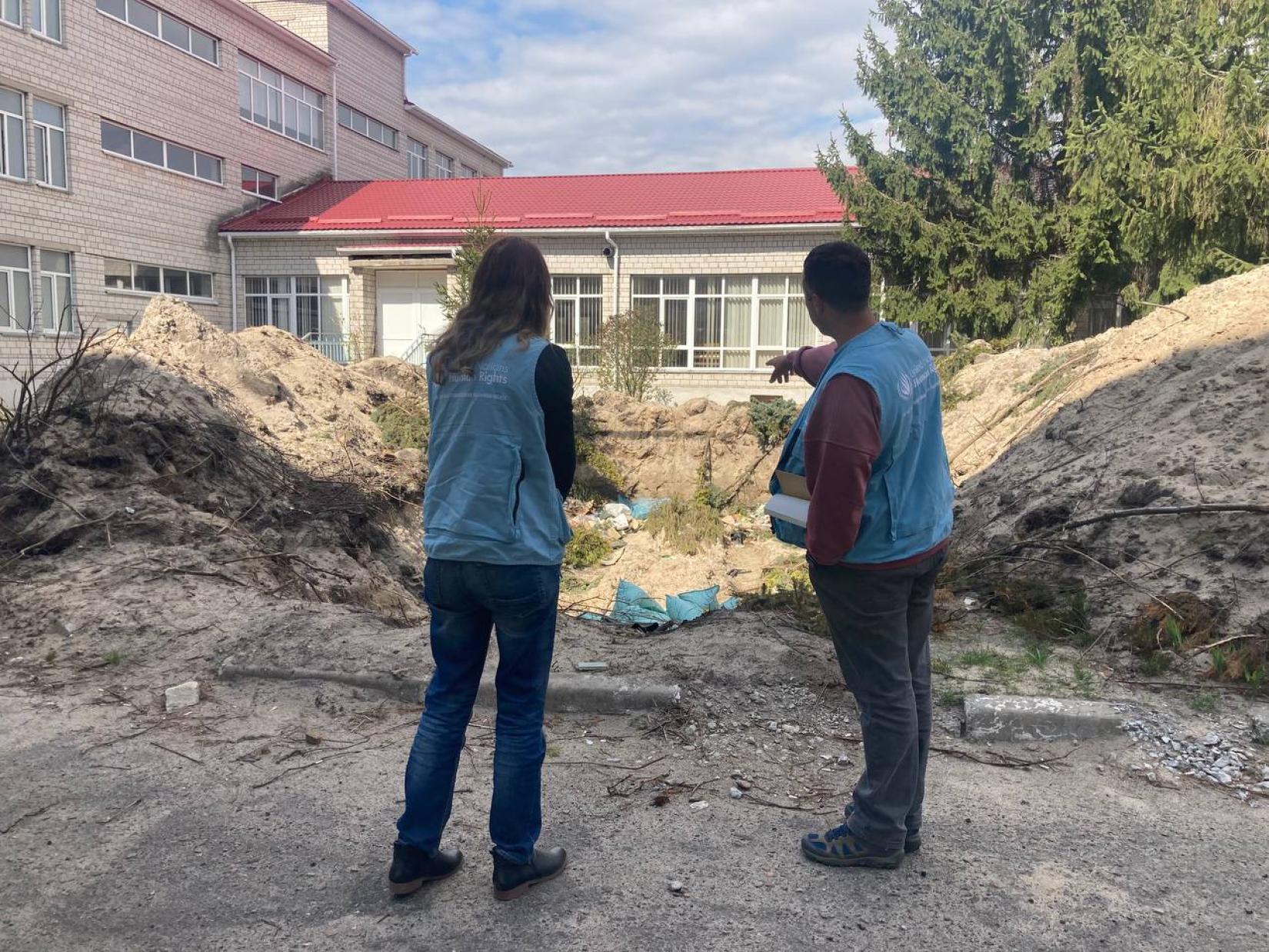
May 2022
Matilda Bogner
My most recent trip was to areas where the Russians left around Kharkiv Oblast. That's where I met with communities who recounted the situations that they had been going through, including summary executions, disappearances, civilian casualties, arbitrary arrests. These types of issues - is what was recounted to us.
Melissa Fleming
Have you ever been worried about your own safety?
Matilda Bogner
Not seriously. I have been in places where I have heard the explosions happening. I've not had any that have been really close to me that I have felt that sort of impact. I mean, of course, I tried to follow all the security rules and do what's needed for protection. But no, I haven't felt seriously concerned for my own security.
Melissa Fleming
I wonder about the mental health. And I wonder if you're concerned that any of your team, hearing these accounts and bearing witness to atrocities. You know, they must be taking in so much that it might be too much at some stage.
Matilda Bogner
Yeah, so certainly I do worry a lot about that. And I do see the impact on staff. For example, preparing this report on summary executions and targeted killings of civilians. It meant that our staff had to go out day after day and talk to witnesses and victims about what they saw about these different killings. It's an awful sort of a crime. And it does impact the staff. It does have a difficult impact. We try to do what we can to buffer that. I mean, there are counselling services available and so on. I know a lot of staff don’t choose to avail of it. I mean, I know myself, I haven't. You know, it's not always easy to decide to use these sorts of services. But at least they are there if somebody wants to.
But I think also, as a manager, we have to try to balance. I think we did see that we did send people out too much. And everybody knew we had deadlines. We need to get this information together. And they were motivated to do it also, because they want the world to know what has happened. But even if you're motivated to do it, sometimes it can be too much. So, we do have to be… We do have to be careful. And we do have to try to provide an environment which is not overwhelming. But it's difficult, because it's not only that, that they're going out every day. Then you come home, and you hear the sirens going off, and you have to go into the shelters. Or you don't go into the shelters, but you should. Then now we have problems with electricity, with water. So, you know these things compound one on top of the other. You spend your day hearing these difficult stories. And then you come home and have to worry about your own security or your family's security, for national staff. And just surviving and making sure that you’re warm enough and all of these things. So, it is difficult.
Melissa Fleming
You did a section of your last report on rape. Can you describe how this war has been in particular for women.
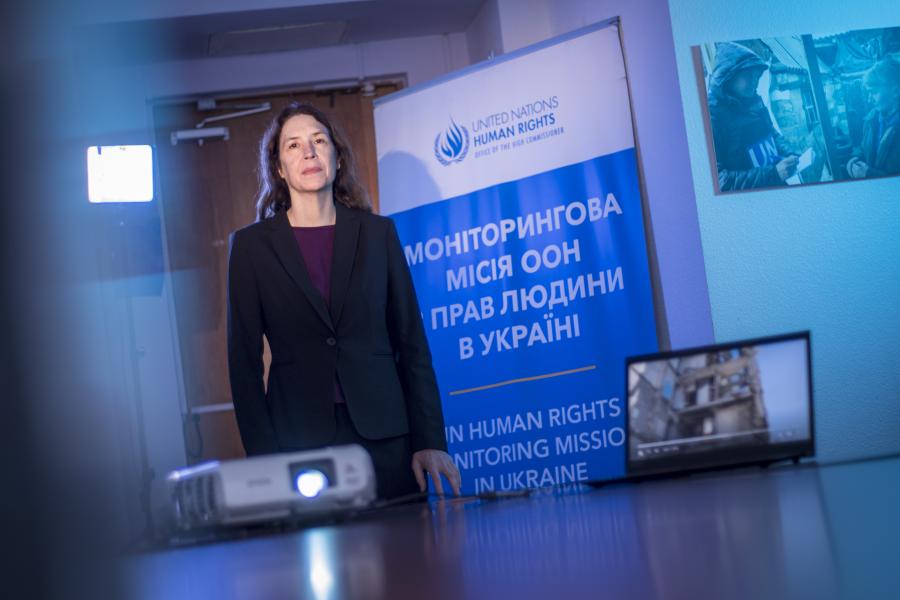
Matilda Bogner
We've put a lot of effort into documenting conflict-related sexual violence. It's a very difficult area to document. There's a lot of stigma around it. When I've been out into communities, I will speak with men who have witnessed and been victims of horrific crimes. They will tell you about witnessing summary executions, about being victims of torture, about their neighbours being disappeared, and so on. But as soon as the question comes up about conflict-related sexual violence, they say, ‘Oh, we heard of one case, but please don't go into it. Please don't look at it. No one wants to talk about it. You're just going to make things worse.’ And it's just that comparison. You've witnessed and seen horrific crimes. And this is another horrific crime. But there's a very different approach to them. One is seen as you're just a victim of an awful crime. The other one is still seen as somehow shameful. And it still comes down to the fact that women are still somehow seen as culpable, even if they are the victim. Of course, nobody would say that to you directly. But that's what the attitude still implies. There's a level of shame on the woman or on the girl for having been a victim of this. So, it becomes quite difficult. But we have documented cases. But since we've been doing more interviews with prisoners of war, we actually find that the majority of cases that we've documented, it's been the victims have been men. And it has been in the context of torture within detention.
Melissa Fleming
I wonder if also you are looking at how this war has affected children in particular.
Matilda Bogner
We report on children as civilian casualties. We report on how the hostilities affect schooling, educational institutions where children go. On how it affects maternal health in terms of hospitals. As well as when children have been subjected to arbitrary detention and enforced disappearance. Luckily, we don't have many of those cases.
Melissa Fleming
I'm thinking about your own children. At the beginning of our discussion, you said you had two of your children living with you in Kyiv. Are they still with you?
Matilda Bogner
Well, they evacuated. The family, on the 24th of February, they evacuated to Moldova. And since they've moved to Budapest. So, they're there now.
Melissa Fleming
With your husband?
Matilda Bogner
With my husband? Yes.
Melissa Fleming
What do they think about the work that you're doing?
Matilda Bogner
That's a good question. I don't ask them that. I try somehow to distance them to an extent. Although, then they see me in interviews. And they're getting older now, so they understand things. And we do discuss the situation in Ukraine. And they used to say that I spend all my time just doing emails. But I think they have a more nuanced understanding of the work now.
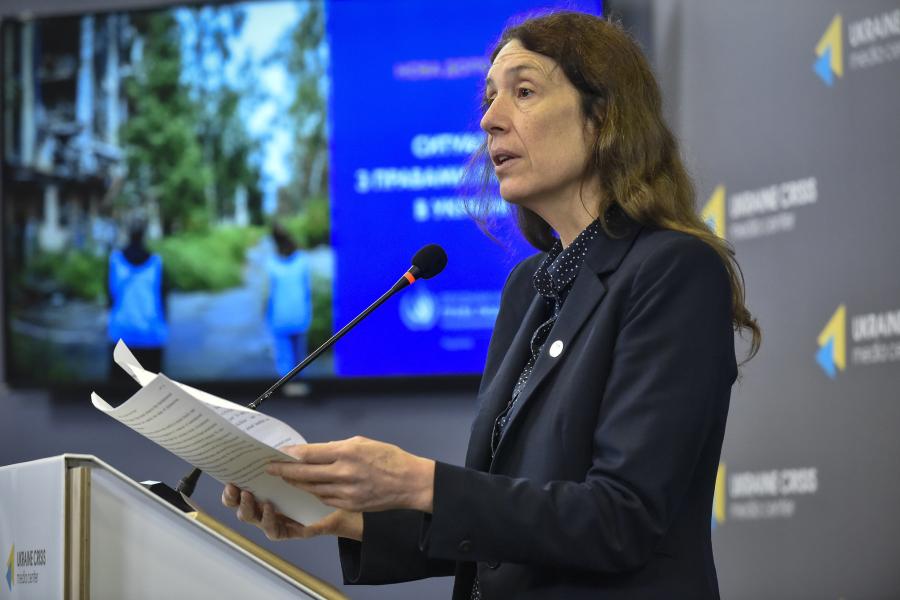
Melissa Fleming
So, if they're asked in school, ‘What does your mommy do?’ What would they say?
Matilda Bogner
Well, I mean, they can say she works on human rights. She works in the UN. Actually, often in the school context, I think they're somewhat proud of it. Because, you know, they know that I've been interviewed on the media, and I've met with, you know, high level politicians and things like that. And they're a bit proud of that side of the work, I think.
Melissa Fleming
Yeah, and it must be a kind of a relief, now and then, to get out of the war zone that Ukraine has become everywhere.
Matilda Bogner
That's what people say, although I often find I feel quite stressed when I'm away because things happen. And I feel I would be able to respond more effectively if I was here. So, sometimes I feel more stressed when I'm away than when I'm just here. I could just focus on it and deal with things. But of course, I'm really happy when I can be with my family.
Melissa Fleming
I can imagine when you're away, and your focus is on what's happening in this war, which is daily. A daily horror for many of the people, much of the population living there. I know the vast majority of the violations that you and your teams have documented were committed by Russians. But I believe you've also documented some violations by Ukrainians.
Matilda Bogner
Yes, we have. And it is important. Any violation is a violation, and it needs to have accountability. The victims need to have a remedy. And they need to be prevented in future. So, it is important for us to document, to report on all violations, including those that are committed by Ukrainian forces. One of the big areas where we have documented violations have been for prisoners of war. When the Russian prisoners of war are captured, they are often beaten. They are often facing torture or ill treatment. I have interviewed a Russian prisoner of war myself who described how after his capture he was beaten. Then he was held in an informal place of detention for a number of days, where he was electrocuted. Where he was forced to stay awake all night in different stress positions. And if he started to fall asleep, he would be beaten. So serious forms of torture and ill treatment. And then various forms of torture and ill treatment as they have been transported to places of detention. Once they're in official places of detention, there has been a significant improvement in their treatment. And we've had less or few complaints regarding torture or ill treatment. With some exceptions of specific facilities where it where it does happen.
So, this is something that clearly the Ukrainian authorities need to look at. They need to investigate. They need to hold those responsible to account. And they need to put in place mechanisms and instructions and so on to stop this from happening again in the future. Another area where we have documented violations on the Ukrainian side has been arbitrary detention, and disappearances. As you said, the scale is very different to the scale that we've documented on the Russian side. It's about 10 times more on the Russian side. But there's still numbers of people who face disappearance at the hands of Ukrainian authorities and who face arbitrary detention. So that's serious. And, again, it needs to be dealt with.
Melissa Fleming
And maybe just a few words on the prisoners of war, the Ukrainian prisoners of war who've returned from Russia. You were able to interview them as well. What was their…?
Matilda Bogner
Yes. They have suffered to torture and ill treatment. For the most part, it was not so much upon capture. It was after that. It was during transportation where conditions were often inhumane. People had their eyes and their hands taped so tightly that they would get wounds on their face, on their hands. They would be bleeding for days. They would not be allowed to go to the toilet for long, long periods. And then when they arrive in places of internment, they would be beaten. And then individuals who would be of particular interest if they had a type of job where perhaps they would have more military intelligence. Or could explain more what the tactics or the strategy of the Ukrainian forces was. They would be particularly targeted for interrogation. And during interrogation, very organized forms of torture. Electrocution. Hanging up from arms and legs. Beatings, including with implements. These types of things were happening to the prisoners of war held by the Russian Federation.
Melissa Fleming
What is keeping you awake at night these days?
Matilda Bogner
Oh, you know, it's all the day-to-day issues that we're dealing with. They just keep going through one's mind. And it makes it hard to go to sleep and the workload is just overwhelming. So, it's literally working until you go to sleep. And so, the work just keeps going through one's mind. But I have to say staff security and welfare is high up on the list of worries.
Melissa Fleming
What do you do to kind of decompress and draw some strength?
Matilda Bogner
I go and see my family. Yes, and I talk to my children who give me very different perspectives on the world. Even though they're getting big now, but they still have a different perspective to those more serious adult perspectives that I usually hear on a day-to-day basis.
Melissa Fleming
Thank you very much, Matilda, for joining us on Awake at Night.
Matilda Bogner
Thank you. Thank you for having me.
Melissa Fleming
Thank you for listening to Awake at Night. We'll be back soon with more incredible and inspiring stories from people working to do some good in this world at a time of global crisis.

